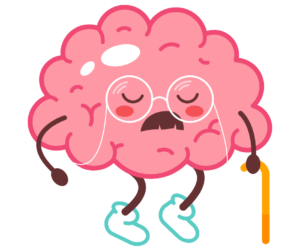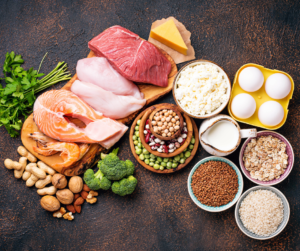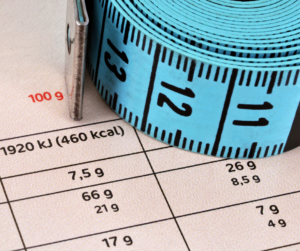Welcome back, you beautiful people. This is part 5 of I-still-am-not-really-sure-how-many-parts, but f*ck it; this is my blog, and it will be as many parts as I feel like making it! Anywho, in parts 1 – 4, we have talked about the primal old man brain, the modern teenager brain (PS – if you haven’t already read those parts, you will want to do that here, here, here, and here), and the synergistic beauty and pain in the ass the 2 of them can be.
Today, I want to talk about how we manage them. Fundamentally, they will always be components we have zero control over, but that does not mean we can’t influence/support them to make it as easy as possible so that you have a better chance of choosing the apple over the apple pie!
I’m focusing on the old man primal brain this time around; I feel it’s the easiest and most tangible place to start. It is more about strategies and practical things we can begin to implement vs. dealing with the messiness of our thoughts, feelings, and emotions. You are welcome. No tears should be shed today!
Who (or what) is old man primal brain?
 As we have reviewed, the primal brain’s focus is on survival – how do I keep this human from dying in the next 5 mins? It is constantly monitoring our environment to ensure that everything is in homeostasis or ‘balance.’ Like Yoda monitoring the balance of the force, if something is out of balance, you can guarantee will us let know he will (#yodajoke). So! If you are cold, the primal brain says turn up the furnace. If you are hungry, it will tell you to find some food. It also doesn’t care about the future, i.e., when your heating bill comes, if you have a heart attack from the 8 Big Macs you just crushed… it did its job of keeping you alive for the next 5 mins. Therefore, maintaining balance will be our first objective. I call this managing the biological needs of the brain.
As we have reviewed, the primal brain’s focus is on survival – how do I keep this human from dying in the next 5 mins? It is constantly monitoring our environment to ensure that everything is in homeostasis or ‘balance.’ Like Yoda monitoring the balance of the force, if something is out of balance, you can guarantee will us let know he will (#yodajoke). So! If you are cold, the primal brain says turn up the furnace. If you are hungry, it will tell you to find some food. It also doesn’t care about the future, i.e., when your heating bill comes, if you have a heart attack from the 8 Big Macs you just crushed… it did its job of keeping you alive for the next 5 mins. Therefore, maintaining balance will be our first objective. I call this managing the biological needs of the brain.
Managing Biology
There is one part of the brain in particular that is involved with balancing the force. It is called the hypothalamus. It is found in the deep recesses of our brain, and as you can see in the picture below, it is pretty small, but it has a powerful role in controlling everything from your sex drive and body temperature to your weight and feeding behaviours. It is a part of our primal brain, but I like to think of it as having a very binary or yes/no function.

If you have gone long without food, the hypothalamus receives a signal – “I need food. Feed me” from the rest of the body. It then sends a signal to other parts of the brain, particularly the mesolimbic reward centre of the brain – “Body hungry. Find food.” The conversation and signalling are much more complex, and I am sure, sophisticated. Still, thinking of a caveman talking in your brain when you are hungry is way more fun than Benedict Cumberbatch sipping on a cup of tea.
Now, the hypothalamus isn’t the one that says eat pizza; that is from your hedonistic reward centre. The hypothalamus just gives the order – ‘Need food. Go find.’ Now, if the hypothalamus never detects a signal that the body is hungry or requires calories, it would never send a signal to the brain’s reward centre telling it to find food. While this signal is impossible to eliminate, we can certainly try to reduce it and make it more manageable.
Guiding Light(s)
 I have 3 rules or guideposts that I like to focus on with my clients:
I have 3 rules or guideposts that I like to focus on with my clients:
- Protein
- Eating consistently
- Consuming a minimum amount of calories
Now the signalling to the hypothalamus that the body is hungry is much more intricate and complex than just the above; insulin levels, number of fat cells, etc., but focusing on these 3 rules is simple, and they play a role in all of the intricate signalling. So don’t @ me that I am making this seem too simple; yes, I am talking to you keyboard warrior healthcare providers!
#1) Protein
 Let’s talk about protein, the king of the macronutrients (want to learn more? Watch my webinar on macronutrients). And for today’s brief overview, I don’t want you to get too caught up in ‘how much protein’; I want you to think about how you can make protein a focus of your meals and snacks. For example, chicken for dinner? Ok, chicken is where we start to get a healthy protein portion, then you can think about what carb, veggie, and fat portions you want on the side!
Let’s talk about protein, the king of the macronutrients (want to learn more? Watch my webinar on macronutrients). And for today’s brief overview, I don’t want you to get too caught up in ‘how much protein’; I want you to think about how you can make protein a focus of your meals and snacks. For example, chicken for dinner? Ok, chicken is where we start to get a healthy protein portion, then you can think about what carb, veggie, and fat portions you want on the side!
If our protein intake is too low, the hypothalamus will be getting all kinds of signals and alarms that protein is needed, and thus you will find yourself seeking out food. There are a couple of reasons for this –
#1 your body can’t store protein very well. We have some carb and fat reserves, but protein needs to be continually added to the system to ensure our cells and such can do all the cells and such things.
#2 if you are short on carbs and fat, protein can be used to create carbs and fat, albeit not always easy, but it can be done. Whereas carbs and fat can only be turned into so many proteins and amino acids, we must obtain the rest from our diet! So eat some damn protein!
#2) Eating Consistently
 In terms of eating consistently, this will vary between individuals. And no, we do not want to eat 6 meals/day to rev up our metabolism. This is a bunch of bullshit, and it has no scientific basis.
In terms of eating consistently, this will vary between individuals. And no, we do not want to eat 6 meals/day to rev up our metabolism. This is a bunch of bullshit, and it has no scientific basis.
We want to eat consistently. Whether 2 or 8 meals per day, we must replenish our protein intake and manage our overall hunger. When your body goes long periods without calories or food, your body sends signals to your hypothalamus, saying, “this asshat hasn’t eaten in 18 hours. Can you make them go eat?” Guess what? This signal is being sent regardless if you ‘feel hungry’ or your stomach is growling. Generally, if you wait until your stomach is growling, it is often too late, and the reward centres of your brain are narrowing in on the highest calorie-dense delicious food it can think of. So eating consistently throughout the day can be beneficial.
As I said, there is no advantage to eating twice or 8 times a day, but eating a number of times that works for you is most important. I usually recommend more than once, but 3 – 4 times per day is ideal for most people. Sorry intermittent fasting folks (PS – this is also why IF does not work for 99% of people).
#3) Consuming a minimum amount of calories
 You need to eat a MINIMUM amount of calories. I know this seems weird, but what I mean by this: you need to be eating at least enough to keep the proverbial lights of your body on. You need to have enough energy to breathe, digest, and poop.
You need to eat a MINIMUM amount of calories. I know this seems weird, but what I mean by this: you need to be eating at least enough to keep the proverbial lights of your body on. You need to have enough energy to breathe, digest, and poop.
You might hear people call this your Basal Metabolic Rate or BMR. My BMR for a 31-year-old 5’10”, 200 lbs male is ~1800 calories per day. If my energy intake falls close to or below that, I become what could be considered a Cranky Cathy. To find out your BMR, type ‘BMR Calculator’ into Google and you will get about a bazillion hits. Anyways, this is the bare minimum amount of calories we need to achieve in the day and for 99% of us, we need more than that to lose weight AND prevent us from murdering people #winwin.
That’s right; 1200 calories per day does not work for weight loss. Suppose we get near or below this calorie intake. In this case, the hypothalamus will be receiving a mob of signals about hunger, like people trampling each other for a waffle maker on Boxing Day. I also say a minimum because, life. Life involves food. It is a part of our culture, our celebrations, etc. Food plays a role in just about all the social gatherings and societal constructs we have. Therefore, there will be days when you are eating more calories. If you are skipping cake on your birthday because you feel you need to in order to lose weight, you are doing it wrong.
Got it; now what?
 That all seems simple, right? Now don’t be like most people and try to overhaul your entire life at present. Start slow – maybe start with incorporating more protein into one meal or snack first. Then try adding some or more into lunch; then try eating 1300 calories a day instead of 1200. Start slow and build your way up. Many of these changes will seem foreign and hell, even scary, but if we start slowly, we can progressively begin to incorporate them into our day-to-day, giving us a greater chance of reducing the signals sent to your hypothalamus and keeping that old man primal brain from getting too carried away!
That all seems simple, right? Now don’t be like most people and try to overhaul your entire life at present. Start slow – maybe start with incorporating more protein into one meal or snack first. Then try adding some or more into lunch; then try eating 1300 calories a day instead of 1200. Start slow and build your way up. Many of these changes will seem foreign and hell, even scary, but if we start slowly, we can progressively begin to incorporate them into our day-to-day, giving us a greater chance of reducing the signals sent to your hypothalamus and keeping that old man primal brain from getting too carried away!
Hopefully, all the above makes sense. Not to worry, I will delve into the above in more detail in future blogs but let me finish this series first! My hedonistic brain is becoming bored, or they are concerned I am letting all their secrets out. Either way, we have maybe 1 or 2 more parts remaining!
Stay tuned and remember – small tweaks lead to massive peaks!
Until next time,






